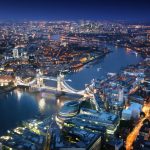It would take a brave interviewer to interrupt Amy Lamé in full flow on the richness of all London has to offer. Over the space of 45 minutes, Lamé enthuses about music venues, Soho, LGBTQ+ spaces, the benefits the Night Tube brings to late night travel, al fresco dining and a host of other attractions across the capital.
It’s now just over seven years since Lamé became London’s first ever Night Czar, appointed by Mayor Sadiq Khan early in his first term. It was quite the fit for Lamé, who over a number years was a well-known figure on London’s LGBTQ+ night time scene. But during her career, she’s had a number of incarnations – DJ, TV and radio presenter, podcaster, political activist and long-time campaigner for LGBTQ+ rights.
The Night Czar role was a manifesto commitment of Khan’s from the 2016 election, drawing considerable media interest as the first of its kind in the UK. It’s clear Amy saw the role as a logical next step – “what drew me to the role…was drawing on my experiences growing up and working myself at night” and “realising that I had the possibility of making a difference to the people and the businesses that work and operate at night”.
Many hold the perception that the Night Czar is just about bars, pubs and clubs – but they’d be wrong. Throughout the interview Lamé makes clear that it goes much wider than this, taking in planning, public safety, music venues, public transport and much more.
The interview takes place just a few days after the Mayor published UKHospitality figures that showed that the capital’s hospitality sector is worth £46bn to the city’s economy. On the back of this, Lamé speaks about her optimism at the progress made over the last 12 months, citing the million people that attended live music events in just one week last summer. That’s not to say there aren’t challenges – as Lamé herself stresses, many businesses are struggling with shortages of workers, rising rents and business rates and the pressure from development.
Saving particular praise for the City of London, Amy describes it as a “success story”, citing Destination City as a blueprint for what can happen if councils are really determined. She adds that “the City really understand the need to plan better for life around the clock. Take street lighting – they’re the only [local authority area] with a lighting strategy looking at how it can improve access and safety”. But she also sings the praises of the Royal Borough of Kensington and Chelsea, which has adopted their own al fresco dining and are making a success of it. Lamé argues that “al fresco dining can be a huge success during summer months and the Mayor and I want boroughs to think of innovative ways to create more opportunities for it. It creates a more open and welcoming atmosphere and is good for business”.
The interview touches on planning, and waxes lyrical over how the London Plan is the first to have the nighttime economy at its heart. She cites the agent of change principle (which places the onus on developers to mitigate against noise in new buildings located near existing venues), that boroughs are now obliged to produce nighttime strategies (citing Wandsworth’s recently published strategy) and the work of the Culture at Risk office – the first of its kind in the world and now being replicated elsewhere – in helping protect nighttime venues and spaces.
On the challenge of competing pressures in a growing city, Lamé feels strongly that it is possible to get the balance right. “Residential and nighttime can live side by side” she says, adding that “it’s one of the reasons I love living in the borough of Camden – I don’t want to live in a dead area, I want to live in a vibrant area”. Unsurprisingly, the issue of the Stratford Sphere comes up – recently turned down by the Mayor. In response, Lamé is clear that there is the need to “balance” ambition with wider interests.
That being said, Amy stresses that it is this 24-hour vibrancy that contributes to London’s status as a global city, standing us out against our rivals. “It’s what London is built on” and that “it is possible for residential and commercial to exist together, otherwise we’ll turn into A N Other city where everything is segregated. That is not London life”.
Covid has also had a huge impact, and the impacts still linger on. During her time in the role, the pandemic hit many venues and businesses hard, some not surviving the massive shock lockdown caused. “Before Covid, the economy at night was growing faster than it was in the day”, says Lamé, but “Covid changed everything. We realised only when the bars, clubs, venues and [other] spaces were shut that as well as being crucial to the economic wellbeing of our city, these places also mattered for the social wellbeing”.
Amy’s passion for London and her Night Czar role has its roots nearly three decades ago when she first arrived on our shores and launched her own legendary nightclub – Duckie – which became a firm fixture on London’s LGBTQ+ calendar over 27 years. Based at the Vauxhall Tavern, Duckie became famous not just in London, but across the country and further afield. “I had in my mind that London has always been a city that welcomes people to be their true selves. No one moves here for non-stop sunshine – we move for the culture, the social life, the diversity and the inclusivity. And the richness this city gives us”.
Her close attachment to the Vauxhall Tavern saw her integral to the fight over several decades to help save the venue from redevelopment. Cutting her teeth at the coalface of the tensions between London’s competing pressures of residential, commercial and the night-time economy has certainly stood her in good stead.
Unsurprisingly, given her background, the interview touches on LGBTQ+ venues. “Back at the beginning of my time in the role, we commissioned a report that showed we’d lost 62% of our LGBTQ+ venues over a decade. We’ve got better at identifying what help we can provide and during Covid I am so pleased we didn’t lose a single venue”, she says. Lamé accepts that while planning policy isn’t everyone’s cup of tea, “embedding protections for LGBTQ+ venues in the London Plan – while not sexy – is the nuts and bolts of protecting vital social infrastructure”.
This leads into a discussion about safety. People moving around the city at night must be confident they can do so safely and securely and there has been much recent coverage of public safety concerns, including rising levels of crime on public transport. Lamé makes the point that one of the best ways to improve safety is for higher footfall in actively used public spaces. She also cites with pride her Women’s Night Safety Charter, with those signing up expected in return to prioritise women’s safety. Over 2,100 venues, charities and organisations are now on board, with Tesco, Boots, the Co-Op and all seven of London’s Premier League football teams signed up. There’s even interest from beyond the M25, with Lamé citing Cardiff, Bristol and Manchester as having adopted it.
Looking to the future, Lamé is clear London can’t rest on its laurels – “we need more ambitious, innovative and exciting venues, businesses and attractions in our city if we’re to remain the best city in the world”. And one thing is certain – Amy’s future, despite being from foreign shores, lies in London. “I’m definitely a Londoner”, she stresses, “there’s no sending me back!”
This interview was conducted by London Communications Agency on behalf of the London Property Alliance as part of its curation of the monthly Central London newsletter.
Read more from our London Leaders series here.


